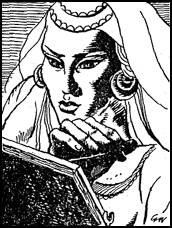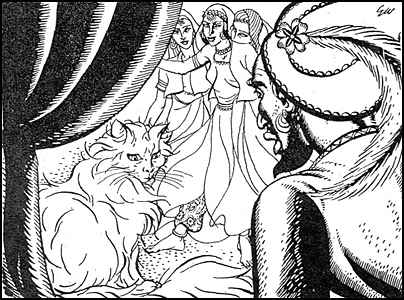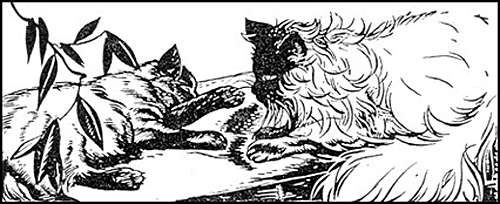The Tale of Shah
By Joan Hyde (nee Hudleston)
Two cats were sunning themselves on the garden wall.
One was a handsome, blue Persian with great,
amber-coloured eyes. He was called "Shah" which means King.
Peter, the other cat, was just a tabby, but he was beautifully
striped, and had a very fine tail.
Now and again one of them would make a sleepy
remark in cat language, and as the sun climbed higher,
Peter said, "It's too hot on the top of the wall. Why
don't you come over into my garden, and we'll lie under
the big elm?"
As the two cats strolled across the lawn, Peter continued,
"It's a pity that you have no shady trees on your side of the fence."
"I have a family tree," said Shah proudly.
"What is that?"
"It is something my mistress keeps in the drawer of her writing-desk. It gives the names of my grandmothers and grandfathers for many, many years; but,unfortunately,it doesn't go back to the first Persian cat of all."
"Who was the first Persian cat?"
"Ah,thereby hangs a tale."
"A cat-tail?" inquired Peter.
"I mean a story, silly. A true story. Would you like to hear it? "
"Very much," said Peter politely.
So Shah stretched himself more comfortably, and began:
Many years ago, there reigned over Persia a great King. His reign was a peaceful
and prosperous one, and when affairs of state were not too pressing, it was his
pleasure to travel in foreign lands. When he came back from these voyages,
he always brought fine gifts for the royal household, and especially for the
Queen.
The Queen's collection of jewels, many of them brought home by the King
from his travels, was probably the finest in the world at that time. You can
therefore imagine her disappointment when, on his return from a long voyage
to the far North, he brought her nothing but a tiny casket containing a plain,
gold thimble.
Now, the Queen had quite a number of thimbles, some of them set with jewels,
and she could not understand why the King had given her such a trifle.
She did not wish to hurt his feelings, however, by showing her disappointment,
so she thanked him warmly, and put the thimble carefully away.
A great banquet was held to celebrate the King's return, and during the feast
the King entertained those sitting near him with stories of the strange northern
lands he had visited. He described a country where there were great snow-covered
plains and rivers that froze in the winter. Many of the people of that country,
he told them, were very beautiful, with sky-blue eyes and hair like spun-gold.
The Persians were amazed to hear of such people, for they themselves were all
black-haired, with very dark eyes and olive skins.
As the King spoke of the beauty of the fair northern maidens, anyone watching
the Queen would have noticed a slight frown between her fine, almond-shaped eyes.
"So that is it," she said to herself. "He has lost his heart to these snow-maidens
of the North, and I, with my black tresses and dark skin, am no longer beautiful
in his eyes. That is why he forgot to bring me a present --- nothing, that is to say,
except that absurd little thimble." Soon afterwards the Queen left the banqueting
hall, saying that she had a headache.
 The next day when the King came round to the Queen's apartments to inquire after
her state of health, he found her seated at her embroidery frame with her ladies
around her. Glancing at her hand, he was rather hurt to see that she was wearing
an old ivory thimble that had belonged to her mother.
The next day when the King came round to the Queen's apartments to inquire after
her state of health, he found her seated at her embroidery frame with her ladies
around her. Glancing at her hand, he was rather hurt to see that she was wearing
an old ivory thimble that had belonged to her mother.
" Does your new thimble fit
you, my love? " he asked.
"I have not tried it on," the Queen replied shortly, and bent her head over her
embroidery. It was a wonderful piece of work. She was putting the finishing
touches to a bird of brilliant plumage --- blue, scarlet, and emerald --- perched
on the branch of a fantastic tree laden with berries. The bird was just plunging
his beak into the bright fruit, and his eye, in which the Queen had sewn a jewel,
sparkled with a kind of wicked delight.
"I forgot to tell you," said the King quite casually,
"that the thimble is a magic one."
At this the Queen looked up from her stitchery. "In what way is it magical?" she
asked the King.
"That I cannot tell you," he replied. "The old woman from whom I bought it told
me it had magic power, but would say no more, though I offered her three times
her price, if she would tell me."
"It is probably all nonsense," the Queen declared.
Nevertheless, she told one of
her ladies-in-waiting to fetch the thimble, and when she returned with it, carrying
it at arm's length as though she expected it to burst into flames, the Queen took
it from her, and slipped it upon her own right hand.
She went back to her embroidery, while the King seated himself beside her.
"That is a beautiful piece of work," said the King.
"I never saw so splendid a bird in all my travels."
"I have nearly finished him," said the Queen, "He needs but seven more stitches
in his tail, and he will be complete."
Stitch, stitch, went her needle. One---two---three---four--five---six---seven!
As she fastened off the thread, there was a sound like a clap of thunder,
followed by a sudden gust of wind that ruffled the King's beard and billowed
out the veils of the Queen's ladies, who huddled together with cries of alarm.
The Queen herself turned pale, for, under her trembling hand, the
embroidered picture was slowly coming to life. The leaves of the twisted
tree rustled in some unearthly breeze, and the silken bird, withdrawing its
beak from the cluster of berries, gave a loud screech, and with a flap of
its wings left the branch on which it had seemed for ever fixed, and
flew right out of the picture.
"Bring me my bow and arrows!" cried the King to a slave standing by.
But the bird, alighting at the King's feet, fixed him with a
cold stare from its jewelled eye and spoke in a harsh, ugly voice:
"A hundred of your arrows would not kill me, O King!" it said,
"for I am a great and powerful Djinn." With these words it turned
its back on the King and strutted up to the pale and trembling Queen.
"You are the Keeper of the Magic Thimble," said the bird,"and to you
I may grant three wishes. What shall the first wish be,
O gracious Keeper of the Thimble?"
Now the Queen was much too frightened to think clearly.
"I do not wish for anything," she said to herself, "I have immense riches,
excellent health, splendid sons and daughters, and a good and kind husband.
What more could any woman want?" Then she suddenly remembered how the King
had spoken of the beauty of the fair maidens of the North, and she thought,
"How delightful it would be if I could have golden hair and blue eyes,too."
So now, as the bird waited for her reply, she made up her mind,
and turned to the creature, meaning to say,
"I wish to have blue eyes and golden hair!" But when she spoke her wish aloud,
she was so flustered as she felt the bird's glittering stare upon her,
that her actual words were:
"I wish to have blue hair and golden eyes!"
The words had no sooner left her mouth than there was another clap of thunder.
All eyes were watching the Queen, who saw expressions of dismay on the faces
of those around her. Not realizing what she had said,
she ran over to a mirror that hung on the wall,
and gave a cry of horror at the sight of her reflection.
In place of her shining black tresses she saw a mass of smoky-blue hair that made
her olive skin appear a hideous yellow. Her once beautiful eyes peered out
at her with a strange, inhuman expression. They were like two golden topazes,
and had a beauty of their own, but a human face did not seem the right setting for them.
The Queen turned from the mirror in rage and disgust, and when she saw the bird
strutting up and down as though it had done something very clever (as indeed it had),
she shook her fist at it furiously and cried, "You have tricked me,
you wretch, you wicked creature. Oh, how I wish I were a cat ----"

Too late the King shouted a warning, the second wish had passed the Queen's lips,
and, where she had stood, the King and her ladies beheld a magnificent cat
such as had never been seen before. Its coat was like a cloud of blue smoke,
and its eyes, set far apart in the noble head, were very large,
and of a beautiful golden colour.
"What a beautiful creature!" cried one of the ladies.
"Beautiful she may be," said the King, sadly,
"but we cannot have a cat for a Queen."
He then remembered that the bird had given the Queen three wishes,
and as she had had only two granted, there was still a chance to save her.
So he suggested to the cat --- or the Queen --- that all she could do now was
to wish that she might return to her normal state.
"And what a waste of three good wishes, my dear," he added,
"I cannot think, why you have been so foolish."
But the cat, I did not seem to hear him. She was
crouched low on the ground, and her head turned from
side to side as she watched every movement of the bird
that still strutted up and down, flaunting its gay
feathers. As it passed within a few inches of her nose,
she made a sudden spring at it, but it was too quick for her.
Down the hall it flew in a streak of vivid colour, and she was
after it in a flash. Up and down all over the palace they chased.
Some tried to catch the bird and others the cat,
while the poor King shouted commands that no one could hear in the uproar.
At last the bird flew out into the gardens with the cat after it,
across the great lawns, through the palace gates and into the city,
with a dozen horsemen from the palace in pursuit, the King himself at their head.
They had soon left the city behind and were across
the river and heading for the desert. All that day the
chase continued, and one by one the King's horsemen
dropped behind from exhaustion, until only the King
was left. Then they came to the Great Salt Desert,
and the King was forced to halt, for it would have
been certain death to venture into the desert with no
water or provisions.
Sadly he stood at the edge of
the desert and watched the two specks that were the
cat and the bird vanish over the horizon. He hoped
that the Queen would remember the third wish and
come back to him again. But the days lengthened
into months and the months into years, and she never returned. The King sent
many expeditions in search of her, but there was never a trace of either cat or bird.
"I like to think," concluded Shah, "that she settled down happily somewhere and
lived to a ripe old age. There is no doubt that she was the mother of all
Persian cats, and I myself may be descended from her. That is to say,
she may have been my great-great-great-great-great-great-great---"
Shah's eyes slowly closed, his chin dropped onto his paws, and he fell asleep.
Peter had been asleep for some time.
"New Zealand School Journal" July 1947.
Return to Top
|
